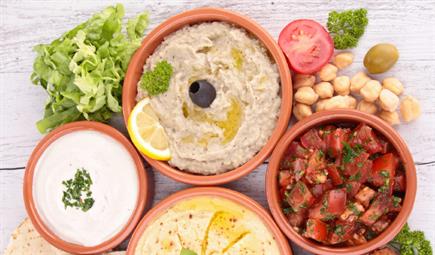Our Doctors
Meet all the doctors from Cleveland Clinic Abu Dhabi.
View Doctors
3 ways to fuel your body and stay fit while fasting

During Ramadan, Muslims abstain from food and drink from dawn to dusk. It is important to get proper nourishment between iftar and suhoor in order to be prepared for the next day of fasting. Healthy habits during the holy month are also very important in order to avoid gaining weight. In this article, we outline a few simple tips to help you stay fit while fasting.
The amount of fluids a person needs depends on age, gender, climate and activity level.
The human body is about 60% water. It is vital for bodily functions, including metabolizing and transporting nutrients throughout the body and removing waste. The amount of water in the body fluctuates – it is lost through urine and sweat and regained from food and drinks. It is not unusual to become periodically dehydrated while fasting. Dehydration can result in weight loss that is quickly regained when normal eating and drinking habits resume.
Hunger tempts us to indulge or eat fast, convenient foods. Highly processed foods are high in salt, sugar and unhealthy fats, which won’t last long and can increase thirst.
The body’s ability to process carbohydrates and fats peaks at certain times of the day. Food eaten outside of this window isn’t broken down as efficiently, which can lead to weight gain. If you aren’t eating at the usual times, it is important to choose wisely.
Planning your activities and meals after breaking your fast will help to refuel you and prepare you for the next day of fasting.
Weight loss occurs when a person uses more energy than they consume. Some studies on weight loss/gain during Ramadan have shown that energy intake remains the same or increases, despite a decrease in meal frequency.
Follow these simple tips to ensure you stay as healthy as possible while fasting. Cleveland Clinic Abu Dhabi is here for you, day and night. Our extended outpatient evening hours are available throughout Holy Month to offer you the care and support you need.

This Ramadan, we are here for you day and night. Throughout Holy Month, we will extend outpatient clinic hours, offering you the best care, when you need it.
Learn More
During the Holy month of Ramadan, adult muslims practice daily fasting from dawn until sunset. Make...
Read Articles
Bariatric surgery, or weight loss surgery can help obese people to lose significant amounts of...
Read Articles
Some of the most important factors contributing to the development of heart disease are lifestyle...
Read Articles